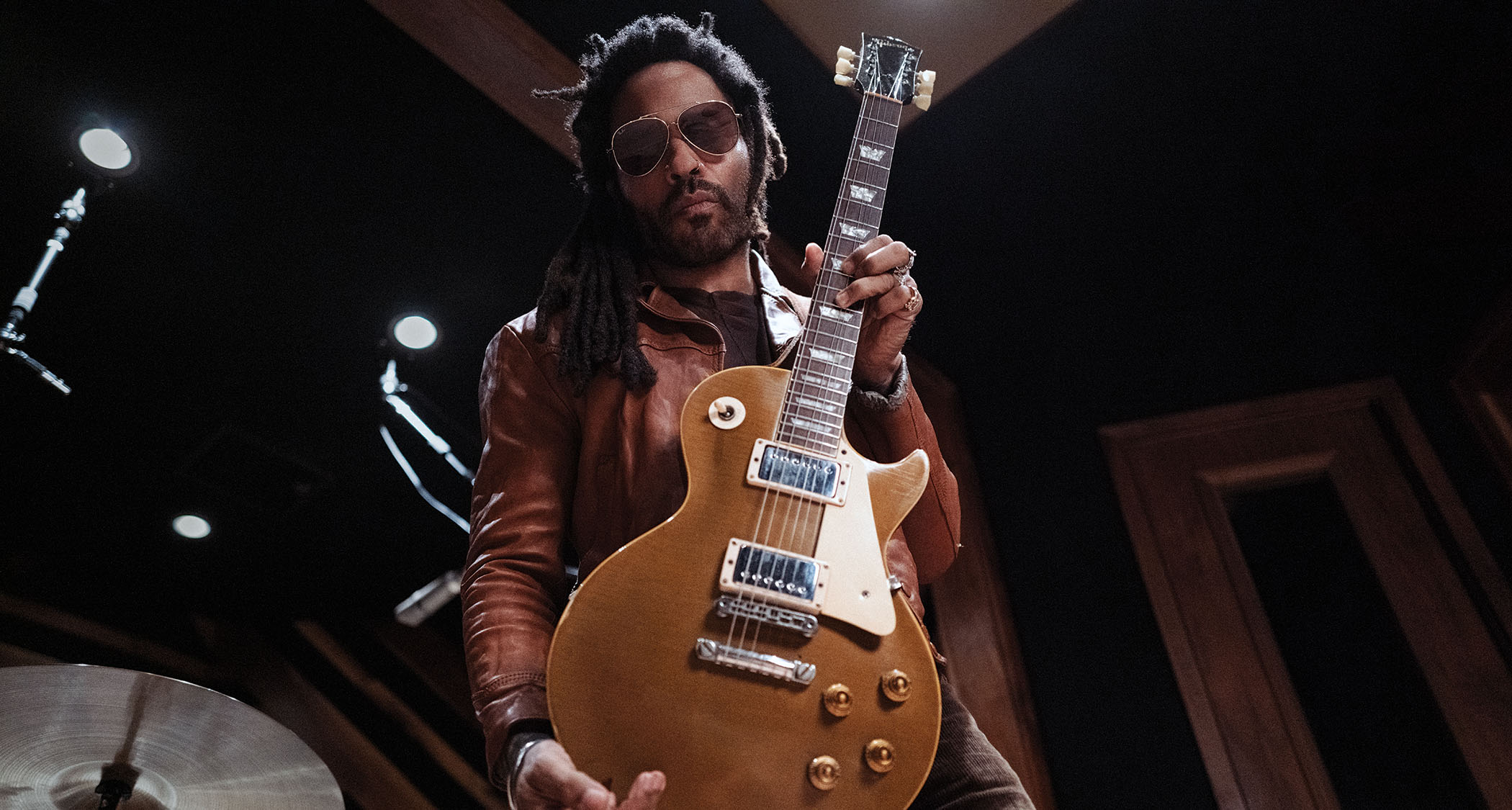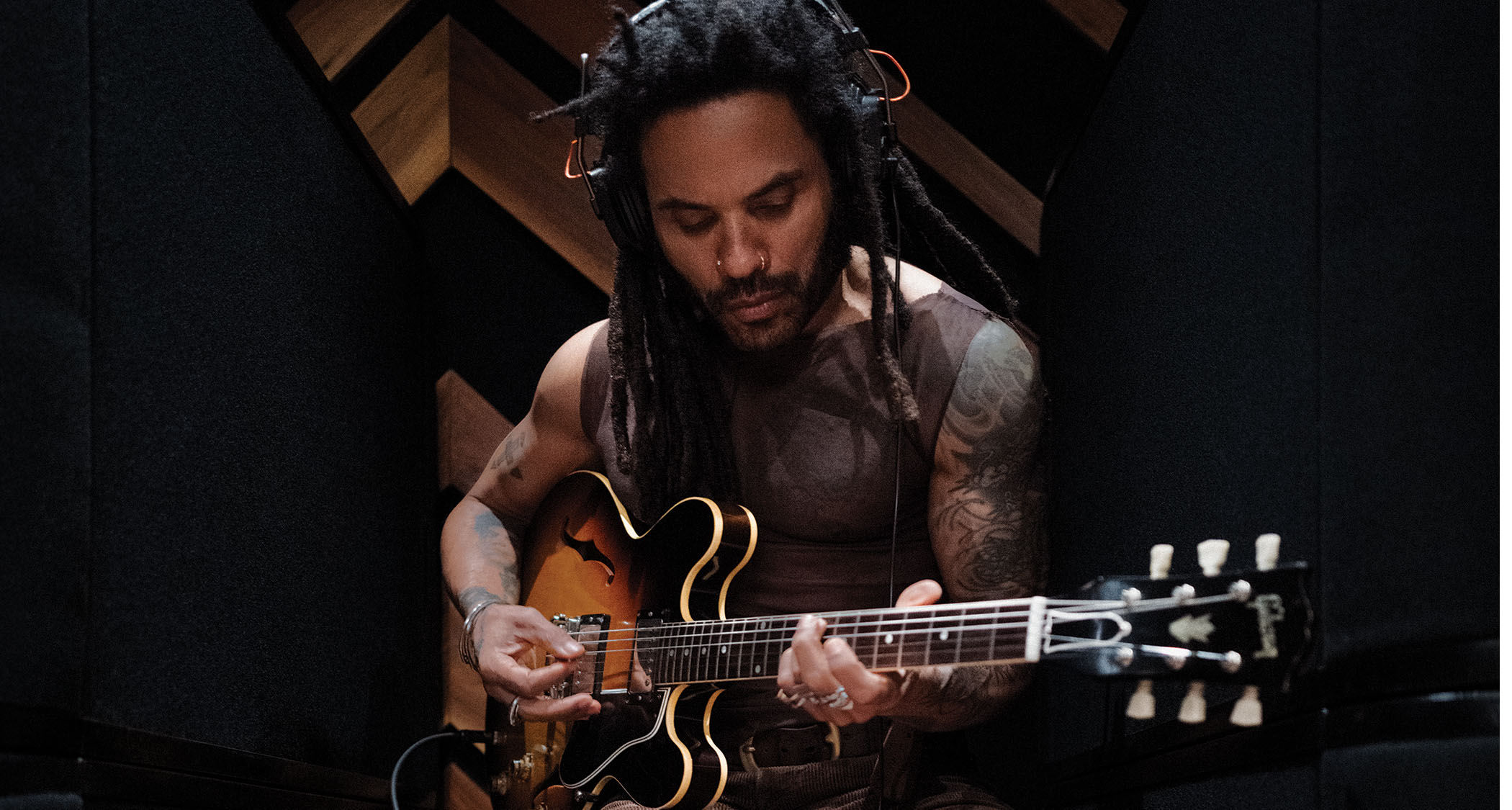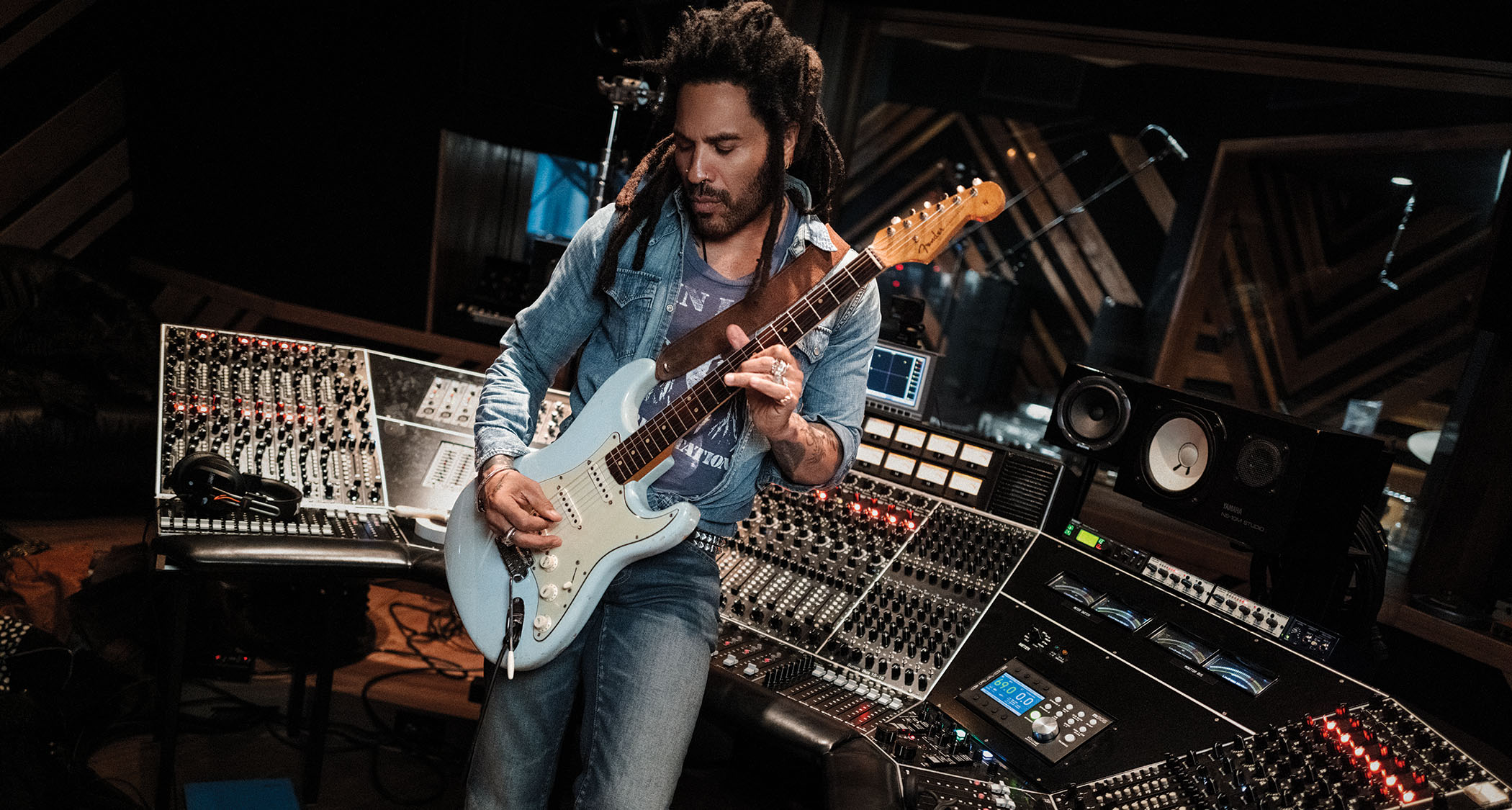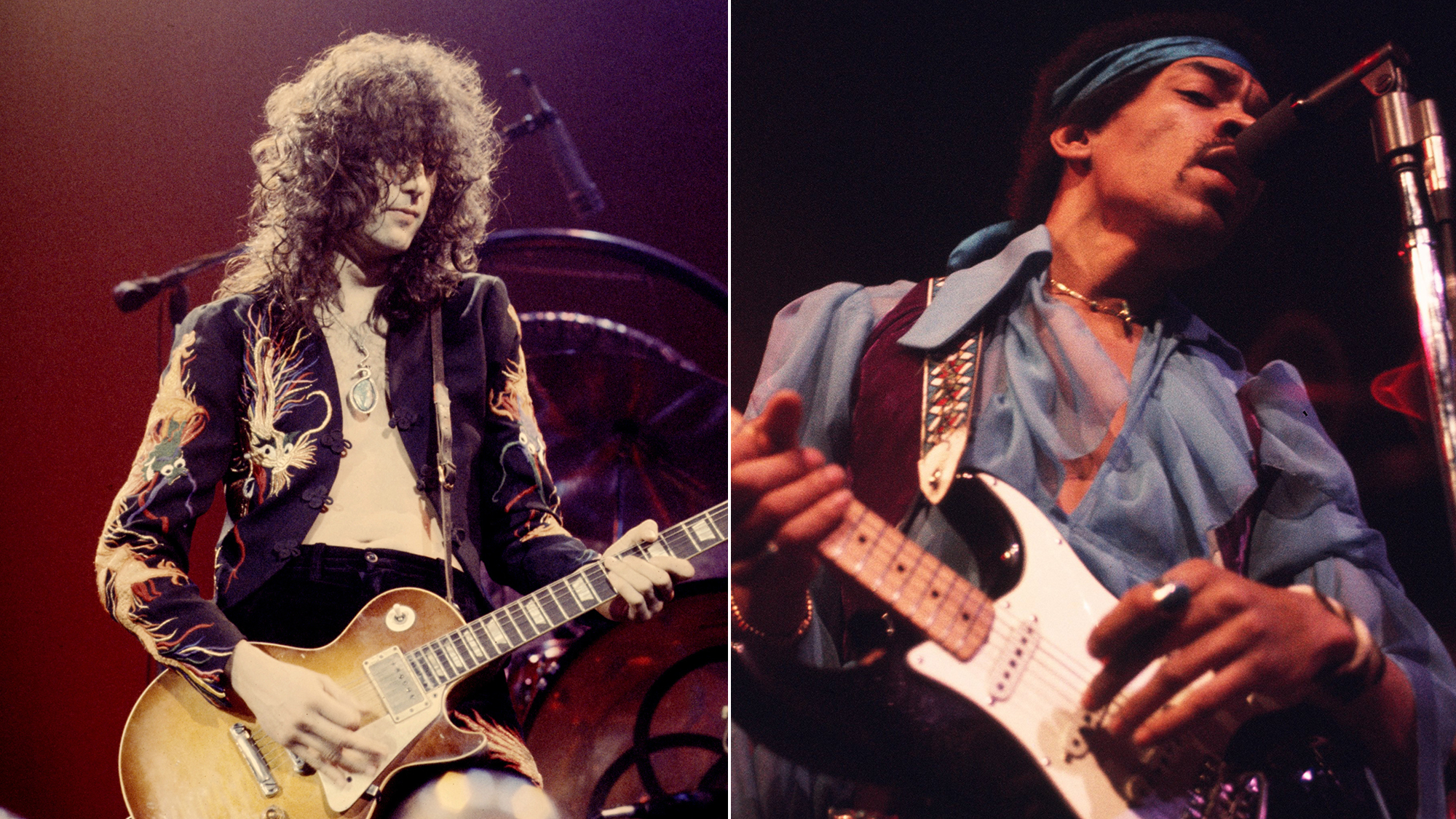“You can play a million notes and have no sense of feel, rhythm or intensity. B.B. King could take one string, one note, one finger and knock over a mountain”: Lenny Kravitz on the pitfalls facing modern players, and why simple is the hardest thing to do
On his 12th record, Blue Electric Light, Lenny Kravitz builds on a career of guitar-into-amp heroics. He looks back on his jams with Prince, why Dumble amps remain his go-to, and what makes his number one Les Paul such a magical guitar

With his well-loved ’53 Les Paul Goldtop slung over his shoulder and a pair of designer shades resting in place, Lenny Kravitz is the epitome of cool. Of course, having a cache of iconic songs at his disposal doesn’t hurt, either.
You’ve heard them before – cuts like Are You Gonna Go My Way, Fly Away, It Ain’t Over ’Til It’s Over and Again have seen Kravitz become an icon of guitar and a key member of the cultural zeitgeist. But what truly sets him apart, as he prepares to unleash his 12th studio record, Blue Electric Light, is his open‑mindedness. “I hope I’m remembered as someone who served the music. And also, for not having boundaries,” he tells Guitarist.
“Whatever style, or whatever works for the landscape of the song, I’m just open. A guitar is a boundless instrument; to shackle yourself would be a disservice,” he continues.
Kravitz’s latest record – which came to him via a combination of dreams, jam sessions and mental downloads – is refreshing. It’s far too easy to get caught up in reinventing the wheel. But not Kravitz, who relishes guitar-into-amp vibes and keeps it pure.
“If I’m going to make a point,” he says, “if I’m telling you something, an emotion, I can talk at you for two hours and give you a lecture, in which case you’ll lose. That’s because if I’m talking and talking and talking, I’ll lose you. Or I can say a sentence that could change your life [and it] took just five words. It’s the same thing with music…”
Did the title track, Blue Electric Light, set the tone for this project?
“That song actually happened at the end of the record. I had no idea it was coming; I had no idea I was going to name the album that. I woke up one night – I dreamt the song, as I do – and I went in and recorded it in the morning. And I thought it would be a great ending for the album and sequence.
Get The Pick Newsletter
All the latest guitar news, interviews, lessons, reviews, deals and more, direct to your inbox!
We’ve written a lot of things in the past, including Are You Gonna Go My Way, where things came out of a jam session
“Then Craig Ross, the engineer of the album, was recording me and he said, ‘You know, that’s the title of the album…’ I thought, ‘Really?’ because I was thinking about some other titles and had some things going around. But after a night of listening to the record with that song, I realised, ‘Yes, that’s the title.’ It was the last thing that happened, as it [tends to be] in a lot of cases.”
Like most of your records, Blue Electric Light blends different genres, and with that, it probably has a lot of themes, right?
“Well, the first track, It’s Just Another Fine Day (In This Universe Of Love), was the first track recorded for the album, which, for me, really set the tone. The drum machine, combined with these beautiful rhythm guitars, leads and orchestrations, was just a nice opening blend.
“That song started it all, but that doesn’t mean it continued in that direction. As you’ve heard, it goes in many different sonic places. But that was the first track. That’s when I realised, ‘Okay, I’m starting an album. Something’s going on here and I like the way this feels and sounds.’”

Once you got going, what sorts of guitar sounds were swirling around in your mind?
“Sometimes, it starts with a riff, but some songs are just written and you find the guitar parts within that structure. Most of the songs were written or conceived by me, picking them up as I do, whether in dreams or during the day – I always say I’m just an antenna. I pick up what I’m being given and what’s being transmitted to me.
“There were a couple of instances when something came out of a jam; that’s how Paralyzed was. One of those days in the studio, I just said, ‘Craig, grab your guitar. I’m gonna get on the drums and let’s just start playing. Let’s just vibe out and see what happens.’
“We’ve written a lot of things in the past, including Are You Gonna Go My Way, where things came out of a jam session, and we’re just finding things and then we stop and say, ‘Okay, we need a bridge, we gotta figure out these chords, but this is the initial groove.’ There’s a couple like that, but otherwise the songs were just complete downloads to my mind.”
Your solos are well placed and the phrasing is always great – you’re very musical and it’s not about showing off. From your perspective, what are the functions of solos within your music?
“I mean, for me, personally, I like them to be simple and memorable and to give and evoke the emotion that I’m looking for. You don’t have to play a lot of notes. For example, if you listen to the solos I play on Paralyzed or Blue Electric Light, they’re simple and melodic.
“They have tension and they move the chord structure along nicely. But I like complicated things, too. It depends on what it is, but, for me, I’m trying to make the least amount of noise in the least amount of notes to make the point.”
What sort of guitars and amps do you rely on most to offer that sound?
“I have my collection of vintage Les Pauls, Strats, 335s and my basses – Precisions and Jazzes. Those are my main studio guitars and I just depend on really pure sound.
“As far as my amps go, I have a [black-panel] Fender Deluxe, that’s probably my favourite studio amp. Dumble did it – it was one he did for me years ago, and he modified that Fender Deluxe for me, too. Then I have my Fender Tweed Deluxe, which I use a lot. I love to just turn them to 10, plugging right in and getting that saturated sound.
“I love that sound; I’ve been doing it since my first record [Let Love Rule, 1989]. I’ll use a Marshall every now and again, but mostly it’s small amps, like the Fenders or a Gibson Skylark. They sound the biggest when you record them properly.”
Small amps react well when you crank them to 10 and push them – you get a lot of natural break-up as a result.
“Exactly. And I don’t depend on pedals. Maybe if there’s a lead and I need a little added texture, I’ll use the pedal in that case. But all my rhythm sounds are just a guitar into an amp, with no processing whatsoever.”
Given the expanse of sounds and textures in your music, that might throw some for a loop.
“I remember jamming with Prince once, and he was like, ‘What is that effect you have on your guitar?’ And I looked at him and said, ‘Nothing. It’s a guitar into a Deluxe, turned to 10.’ He couldn’t believe it. He was a guy that used a lot of processing and did it very, very well. But here he was: he thought it had some kind of effect, you know? I showed him that it was nothing, absolutely nothing.”
Throughout your career, you’ve managed to harness the magic that is a good Les Paul and a quality tube amp. This means people often think of you as a guitarist, which obviously has its merits, but you’re a songwriter, too. What’s the dividing line between ‘Lenny the guitarist’ and ‘Lenny the songwriter’?
“I see the whole thing as one exercise. For example, your assignment as a painter is to have a blank canvas and you get all these colours and brushes, and you make your expression, you make your painting, right? That’s how I look at recording.
I think that’s what I am and where my talent really lies; it’s being the full, big picture, as opposed to saying, ‘Oh, a virtuoso this, or a virtuoso that’
“I have a blank piece of tape, depending on whether I’m using tape or digital, whatever it is. I have this blank canvas and have to make something, so I’ll say, ‘Okay, I gotta grab a bass. I gotta grab a guitar, different guitars. I gotta layer them. I gotta play drums. I gotta play keyboards.’
“So I see it all as one exercise. And maybe that’s because I do everything and I started out doing it that way. I don’t see any walls between the different things. It’s to get this thing that I’m hearing in my head to [actually] sound like what I’m hearing in my head.
“I think that’s what I am and where my talent really lies; it’s being the full, big picture, as opposed to saying, ‘Oh, a virtuoso this, or a virtuoso that.’ It’s putting the whole thing together.”
How do you view the guitar scene today? Do you think there’s too much focus on virtuosity and therefore not enough on musicality?
“I think all of it is out there. But you do see the trends on Instagram with musicians where it’s all about speed, you know? There’s a lot of that, right? And, you know, James Brown used to say, ‘Talking loud but saying nothing,’ so you can play a million notes and have absolutely no sense of feel, rhythm or intensity. And then B.B. King could take one string, one note, one finger and knock over a fucking mountain, right? So I think musicians should be thinking more about feel, dynamics and emotion, if you’re thinking about anything at all.
These guys who can play a million notes, 99 per cent of the time could not do those things deemed ‘simple’ because those things are not simple
“I remember growing up in high school, and the one who could shred the fastest was the most impressive, but they weren’t concerned with the rhythm part per se. So it could be one chord, a funk jam or whether you’re playing like Bob Marley and the Wailers, and your job is that.
“Or it could be like if you’re playing James Brown, and your job is to go in and do what that music requires and not move. That’s your job. These guys who can play a million notes, 99 per cent of the time could not do those things deemed ‘simple’ because those things are not simple. To feel good and to groove is a gift unto itself.”

And that’s something you have mastered over time: the art of not overplaying. That comes through years of doing it, though perhaps there is something to the idea that you’re either born with it or not?
“Yeah, if it’s something I’m born with, then I’ve cultivated it over time. What’s important to me is that, you know, you find a lot of people who would think, ‘Oh, that’s really simple.’ I’ve had a lot of musicians come in to audition and to play in the band, and you give them the simplest part, and they think, ‘Oh God, this is nothing,’ but they can’t play it.
“So it’s always very hard; it’s not always so simple. It’s about the vibe and how you speak. And I love what I do. I’m very passionate about what I do in the studio. It’s my favourite place to be. I love creating in the studio and putting these musical landscapes together. It’s magic to me.”
Was there a particular guitar you used to record Blue Electric Blue Light?
“I have a [Gibson] Goldtop conversion; it’s a ’53 and I bought it years ago [in 1992]. The first album I used it on was Are You Gonna Go My Way [1993], and it’s been on every album since for over 30 years. It’s my number one studio Les Paul. The magic in it is that the pickups have a nice bite, a classic bite.”
You’ve had PAFs installed on it…
“They’re cleaner pickups and they’re so hot, which creates a really nice crunch. When you listen to things like Zeppelin or The Who, you think that the guitar is this gigantic, distorted thing. And you listen to the record, and you’re like, ‘Oh, wow,’ but it’s kind of smaller and cleaner than I thought it was.”
That goes back to your earlier point of not relying on pedals but rather the guitar going directly into the amp – and off you go.
“Exactly, and that’s what moves the air so well. When you congest the track with too much distortion, it takes up a certain space that may not have the same impact. You listen to a lot of Led Zeppelin records and it’s a lot cleaner than you remember it in your mind. There’s a real magic in that guitar that sounds so pure in many of the songs, whatever they may be. And that guitar is the guitar on the song Are You Gonna Go My Way.”
As far as your new record goes, which songs are you most proud of from a guitar perspective?
“Hmm. Well, I like TK421 for the funk aspect. It’s really fun and it was great to play, and we have all these different rhythmic parts that locked together and created a groove. Then you have things like Paralyzed, where I broke out the voice box for the first time in a long time and did the solo on that.”
As far as subtle highlights go, we really like the harmony solo on the track Love Is My Religion.
“Love Is My Religion is where Craig and I played a harmony solo together for the first time ever. We’ve never done that, which is funny. It was like, ‘Let’s drop the rhythm and do that.’ And what’s cool is that, normally, you might keep the rhythm guitar part there and then solo over it. But because I wanted it to sound the same live, the bass carries the structure at that point, and Craig and I play the solo together in harmony. That was a nice moment.”
Looking at your career to this point, how do you hope that Lenny Kravitz, the guitarist and songwriter, will be remembered?
“Just being remembered would be good enough, right? But to start, just that I’m someone who played from the heart and the soul. And that I’m someone that served the music. That’s all I’m trying to do, just serve the music I hear in my head.”
- Blue Electric Light is out now via BMG.
Andrew Daly is an iced-coffee-addicted, oddball Telecaster-playing, alfredo pasta-loving journalist from Long Island, NY, who, in addition to being a contributing writer for Guitar World, scribes for Bass Player, Guitar Player, Guitarist, and MusicRadar. Andrew has interviewed favorites like Ace Frehley, Johnny Marr, Vito Bratta, Bruce Kulick, Joe Perry, Brad Whitford, Tom Morello, Rich Robinson, and Paul Stanley, while his all-time favorite (rhythm player), Keith Richards, continues to elude him.
“It was tour, tour, tour. I had this moment where I was like, ‘What do I even want out of music?’”: Yvette Young’s fretboard wizardry was a wake-up call for modern guitar playing – but with her latest pivot, she’s making music to help emo kids go to sleep
“One of the guys said, ‘Joni, there’s this weird bass player in Florida, you’d probably like him’”: How Joni Mitchell formed an unlikely partnership with Jaco Pastorius

















![John Mayer and Bob Weir [left] of Dead & Company photographed against a grey background. Mayer wears a blue overshirt and has his signature Silver Sky on his shoulder. Weir wears grey and a bolo tie.](https://cdn.mos.cms.futurecdn.net/C6niSAybzVCHoYcpJ8ZZgE.jpg)

![A black-and-white action shot of Sergeant Thunderhoof perform live: [from left] Mark Sayer, Dan Flitcroft, Jim Camp and Josh Gallop](https://cdn.mos.cms.futurecdn.net/am3UhJbsxAE239XRRZ8zC8.jpg)
